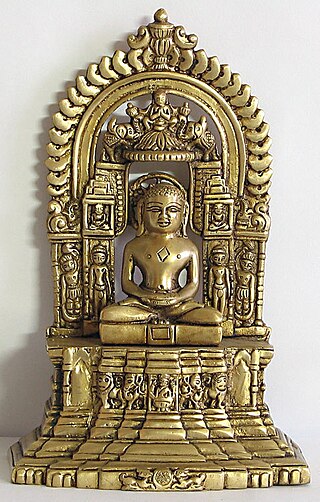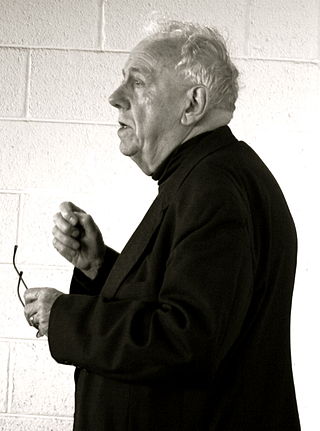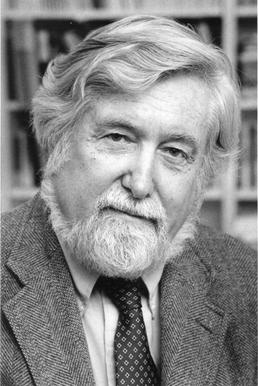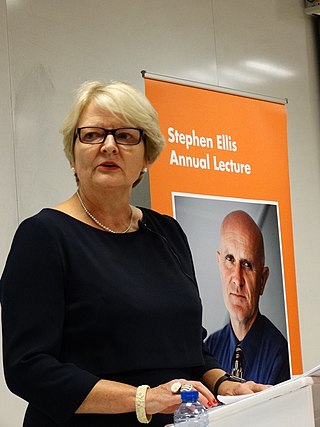Related Research Articles

Ahimsa is the ancient Indian principle of nonviolence which applies to actions towards all living beings. It is a key virtue in Indian religions like Jainism, Buddhism, Hinduism, and Sikhism.

Dharma is a key concept with multiple meanings in the Indian religions of Hinduism, Buddhism, Jainism, and Sikhism, among others. Although no single-word translation exists for dharma in English, the term is commonly understood as referring to "order and custom" that sustain life, "virtue", or "religious and moral duties".
Ethics involves systematizing, defending, and recommending concepts of right and wrong behavior. A central aspect of ethics is "the good life", the life worth living or life that is simply satisfying, which is held by many philosophers to be more important than traditional moral conduct.

Alasdair Chalmers MacIntyre is a Scottish-American philosopher who has contributed to moral and political philosophy as well as history of philosophy and theology. MacIntyre's After Virtue (1981) is one of the most important works of Anglophone moral and political philosophy in the 20th century. He is senior research fellow at the Centre for Contemporary Aristotelian Studies in Ethics and Politics (CASEP) at London Metropolitan University, Emeritus Professor of Philosophy at the University of Notre Dame, and permanent senior distinguished research fellow at the Notre Dame Center for Ethics and Culture. During his lengthy academic career, he also taught at Brandeis University, Duke University, Vanderbilt University, and Boston University.

Clifford James Geertz was an American anthropologist who is remembered mostly for his strong support for and influence on the practice of symbolic anthropology and who was considered "for three decades... the single most influential cultural anthropologist in the United States." He served until his death as professor emeritus at the Institute for Advanced Study, Princeton.
Edwin Oliver James was an anthropologist in the field of comparative religion. He was Professor Emeritus of the History and Philosophy of Religion in the University of London, Fellow of University College London and Fellow of King's College London. During his long career he had been Professor of History and Philosophy of Religion at the University of Leeds, Lecturer at the University of Amsterdam and Wilde Lecturer at the University of Oxford.
John Skorupski is a British philosopher whose main interests are epistemology, ethics and moral philosophy, political philosophy, and the history of 19th and 20th century philosophy. He is best known for his work on John Stuart Mill and his study of normativity, The Domain of Reasons. His most recent publication is Being and Freedom: on Late Modern Ethics in Europe.

Douglas James Davies, is a Welsh Anglican theologian, anthropologist, and academic, specialising in the history, theology, and sociology of death. He is Professor in the Study of Religion at the University of Durham. His fields of expertise also include anthropology, the study of religion, the rituals and beliefs surrounding funerary rites and cremation around the globe, Mormonism and Mormon studies. His research interests cover identity and belief, and Anglican leadership.
Nur Yalman is a leading Turkish social anthropologist at Harvard University, where he serves as senior Research Professor of Social Anthropology and Middle Eastern Studies.

Sir John Rankine Goody was an English social anthropologist. He was a prominent lecturer at Cambridge University, and was William Wyse Professor of Social Anthropology from 1973 to 1984.
Harvey Whitehouse is chair of social anthropology and professorial fellow of Magdalen College at the University of Oxford.

Dame Henrietta Louise Moore, is a British social anthropologist. She is the director of the UCL Institute for Global Prosperity at University College, London, part of the Bartlett, UCL's Faculty of the Built Environment.
The William Wyse Professorship of Social Anthropology is a professorship in social anthropology at the University of Cambridge. It was founded on 18 June 1932 and endowed partly with the support of Trinity College from money bequeathed to them by William Wyse, formerly Fellow and Honorary Fellow of Trinity.
Jyotindra Jain is an Indian art historian and cultural historian, and museologist. A scholar on folk and ritual arts of India, he was the director of the National Crafts Museum, New Delhi, member secretary and professor, at Indira Gandhi National Centre for the Arts (IGNCA), New Delhi, and also professor at the School of Arts and Aesthetics at Jawaharlal Nehru University, Delhi. He has published a number of books on Indian folk art, including, Ganga Devi: Tradition and Expression in Mithila Painting, Other Masters: Five Contemporary Folk and Tribal Artists of India and Kalighat Painting: Images from a Changing World.
Caroline Humphrey, Baroness Rees of Ludlow, is a British anthropologist and academic.
Joel Robbins is an American socio-cultural anthropologist; he is at the University of Cambridge, where he is the Sigrid Rausing Professor of Social Anthropology and the Deputy Head of Division and REF Coordinator for Division of Social Anthropology, as well as a Fellow at Trinity College. He was previously employed at the University of California, San Diego (1998–2013), and at Reed College (1996–1998), and was awarded his Ph.D. from the University of Virginia in 1998. He has published works on the anthropology of Papua New Guinea, anthropological theory, the anthropology of Christianity, religious change, the anthropology of ethics and morals, and the anthropology of value. Ethnographically, he is known for his work with the Urapmin people. His book Becoming Sinners: Christianity and Moral Torment in a Papua New Guinea Society was awarded the J. I. Staley prize by the School for Advanced Research in 2011. He is currently the series editor for the University of California Press "Anthropology of Christianity" book series, and has also served as a co-editor for the journal Anthropological Theory.
Chris Hann is a British social anthropologist who has done field research in socialist and post-socialist Eastern Europe and the Turkic-speaking world. His main theoretical interests lie in economic anthropology, religion, and long-term history. After holding university posts in Cambridge and Canterbury, UK, Hann has worked since 1999 in Germany as one of the founding Directors of the Max Planck Institute for Social Anthropology in Halle/Saale. Hann has made significant contributions to the subfield of economic anthropology.
Michael Barnes Carrithers, FBA is an anthropologist and academic. Since 1992, he has been Professor of Anthropology at Durham University.
Judith Scheele is a social anthropologist, who works in the Sahara. Scheele is based at the EHESS, France.
References
- 1 2 3 "Laidlaw, James 1963–". Contemporary Authors.
- ↑ "LAIDLAW, Prof. James Alexander" . Who's Who . Vol. 2023 (online ed.). A & C Black.(Subscription or UK public library membership required.)
- ↑ "Tripos: Anthropology, oriental studies, law", The Times, 5 July 1984, p. 14.
- ↑ "James Laidlaw". King's College, Cambridge. Retrieved 3 January 2022.
- ↑ "Professor James Laidlaw appointed as William Wyse Professor of Social Anthropology". University of Cambridge Department of Social Anthropology. 16 June 2016. Retrieved 3 January 2022.
- ↑
- ↑ Laidlaw, James (1995). Riches and Renunciation Religion, Economy, and Society Among the Jains. Oxford University Press.
- ↑ "Professor James Laidlaw". University of Cambridge Department of Social Anthropology. Retrieved 3 January 2022.
- ↑ Mattingly, Cheryl. "The Anthropology of Ethics and Morality". Annual Review of Anthropology. 47: 477–479.
- ↑ Laidlaw, James (2002). "For An Anthropology Of Ethics And Freedom". Journal of the Royal Anthropological Institute. 8 (2): 311–332. doi:10.1111/1467-9655.00110.
- ↑ Laidlaw, James (2013). The Subject of Virtue: An Anthropology of Ethics and Freedom. Cambridge University Press. ISBN 9781107697317.
- ↑ Robbins, Joel (December 2016). "What is the matter with transcendence? On the place of religion in the new anthropology of ethics". Journal of the Royal Anthropological Institute. 22 (4): 769. doi:10.1111/1467-9655.12494_1.
- ↑ Keane, Webb (2017). "Virtue's Freedom". Current Anthropology. 58 (1). doi:10.1086/690141. S2CID 152171498.
- ↑ Humphrey, Caroline; Laidlaw, James (1994). The Archetypal Actions of Ritual: A Theory of Ritual Illustrated by the Jain Rite of Worship. Oxford University Press.